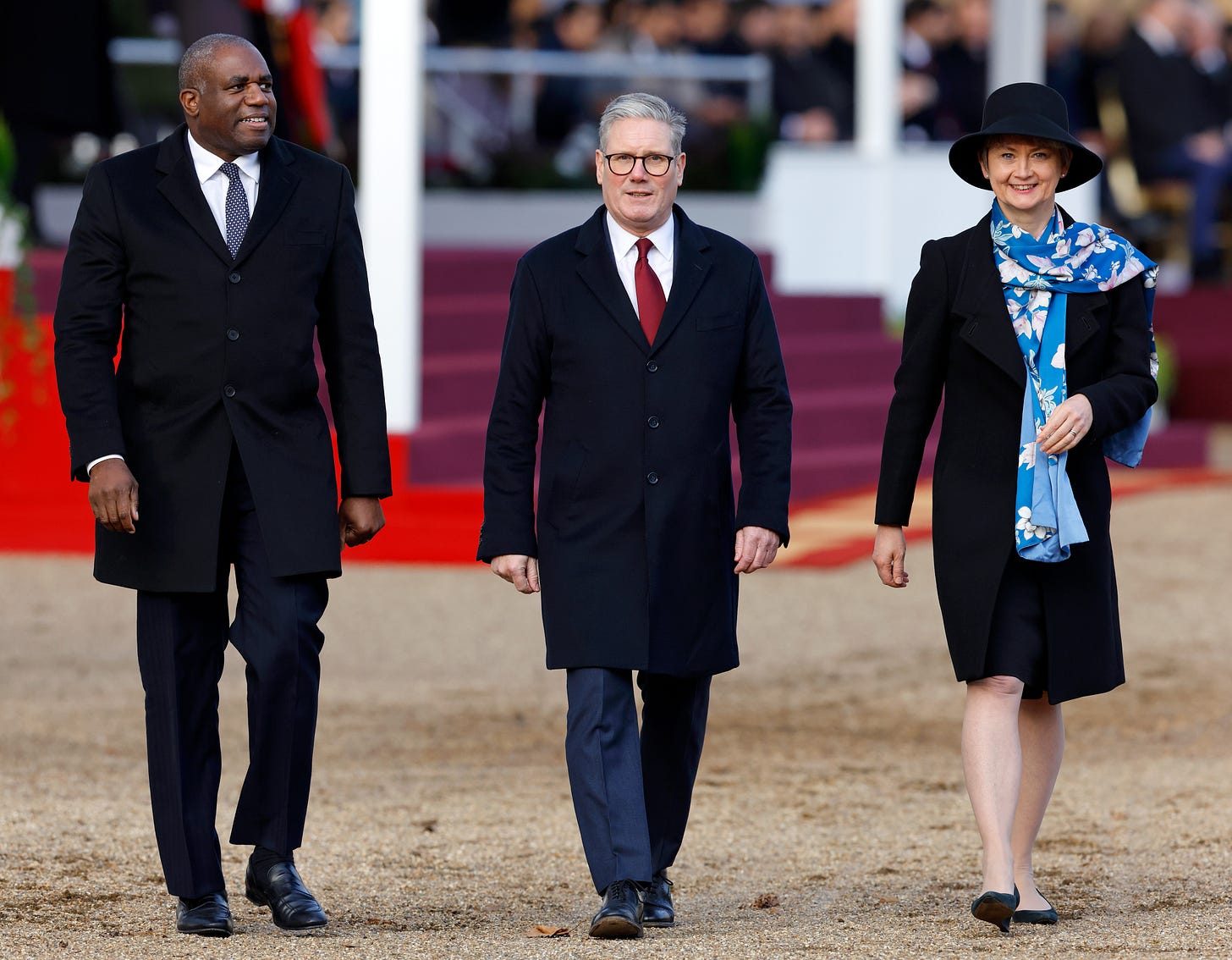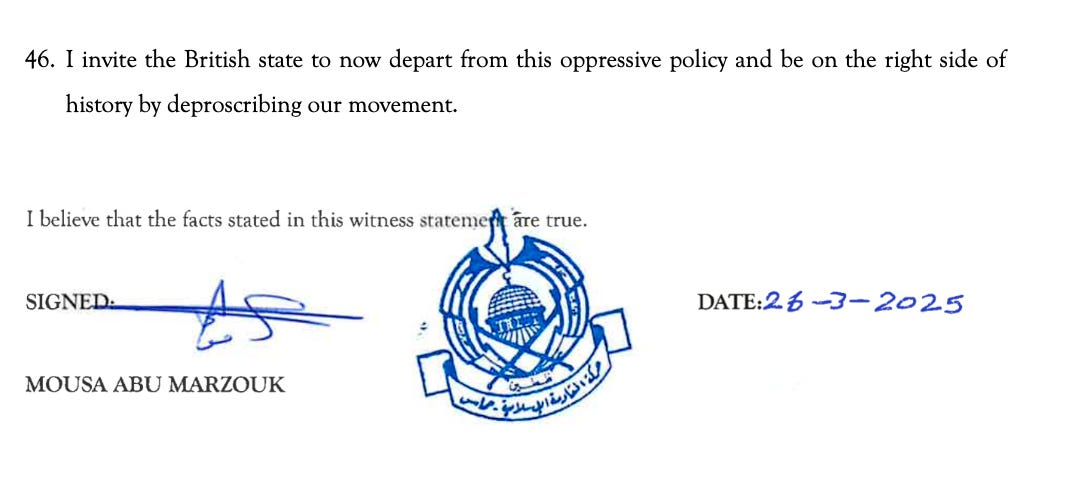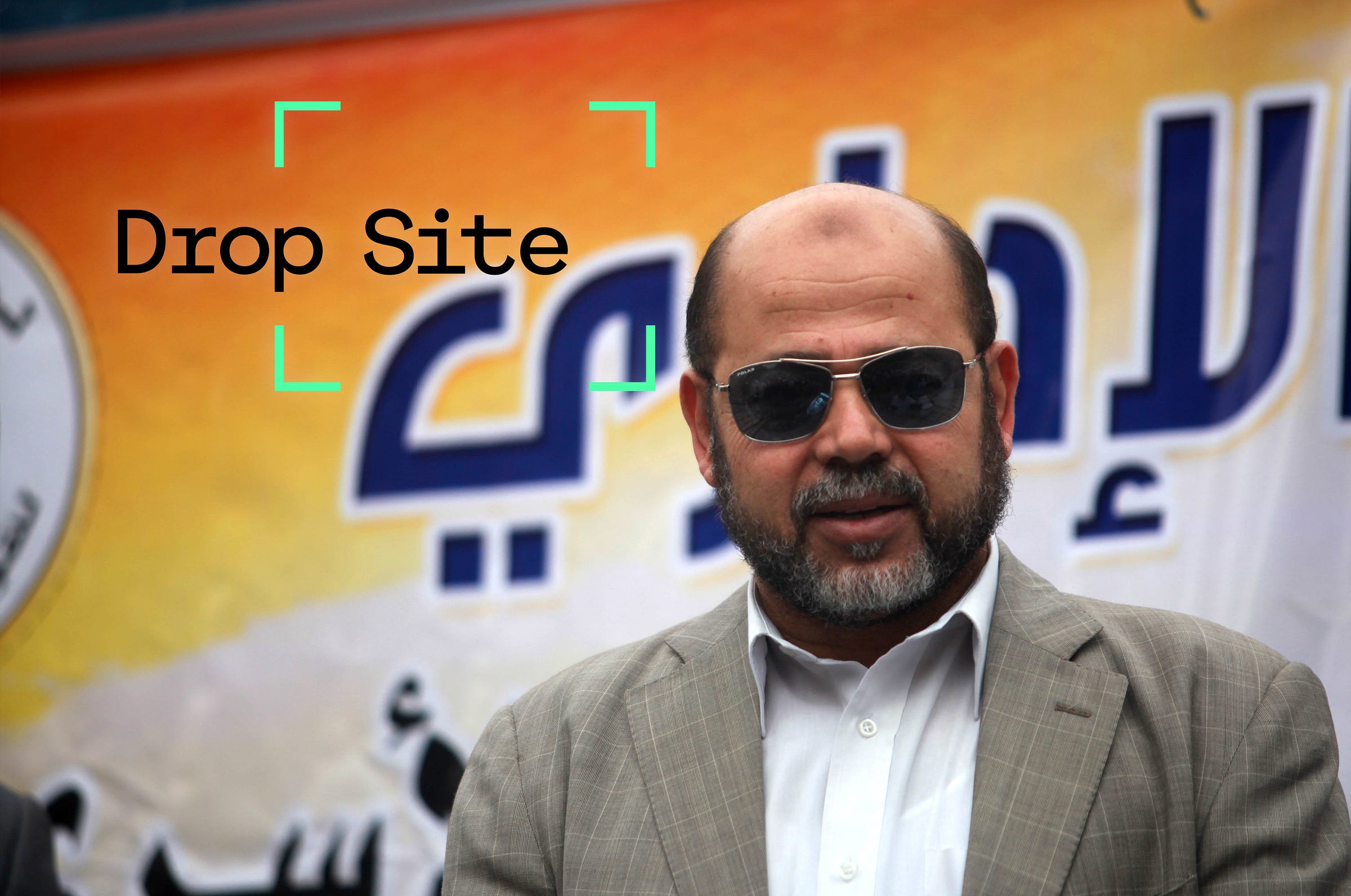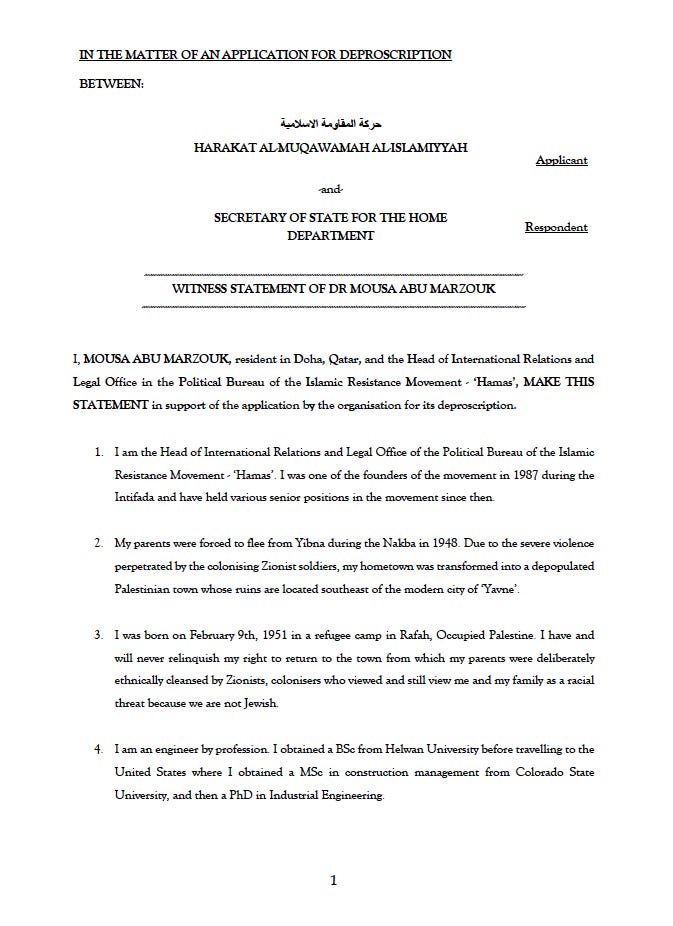Hamas Launches Unprecedented Legal Case in Britain, Demanding the Government Remove its Terror Designation
In a legal filing, a Hamas founder argues that the group has the right to use armed resistance to achieve Palestinian liberation—and that Britain is crushing honest debate about its aims.
In an extraordinary legal filing submitted Wednesday in London, Hamas argued that the British government should remove its designation of the movement as a proscribed terror group and recognize its legitimate role as a Palestinian resistance movement engaged in a struggle for self-determination and liberation. A top political leader of Hamas rejected allegations that the movement is an anti-semitic terror organization, asserted that Hamas poses no threat to Western nations, and argues that the political organization has never engaged in an armed operation outside the boundaries of historic Palestine.
“Hamas is not a terrorist group. It is a Palestinian Islamic liberation and resistance movement whose goal is to liberate Palestine and confront the Zionist project,” wrote Mousa Abu Marzouk—head of international relations for Hamas, and the applicant for the claim to the U.K. home secretary—in a signed and submitted witness statement provided to Drop Site. “We also look outwards to draw inspiration from the glorious tradition of all those peoples and groups who have resisted colonialism, occupation and imperialism in the name of justice, dignity, and human equality,” referencing historical struggles against colonialism and imperialism from across the world. The legal summary prepared by lawyers representing Hamas highlights the African National Congress in South Africa and Sinn Féin and the Irish Republican Army in Ireland as historical analogues to Hamas and the fight for Palestinian liberation.
Marzouk charged that Hamas has been subjected to a concerted smear campaign about its official position, including support for a Palestinian state defined by the borders that existed prior to Israel’s invasion and occupation of the West Bank, Gaza, and East Jerusalem in June 1967—and the subsequent violent campaign of annexation of Palestinian land that continues to this day.
“The British government’s decision to proscribe Hamas is an unjust one that is symptomatic of its unwavering support for Zionism, apartheid, occupation and ethnic cleansing in Palestine for over a century,” Marzouk added. “Hamas does not and never has posed a threat to Britain, despite the latter’s ongoing complicity in the genocide of our people. It is perhaps out of colonial guilt that Britain fears that one day, those it oppresses will strike back against the sponsors of the Zionist entity. Britain should have no such fear.”
Hamas enlisted a team of British lawyers to represent its appeal to the British Home Secretary and to challenge the movement’s terror designation, which went into effect in 2021. The British government designated the Qassam Brigades, Hamas’s armed wing, a proscribed group in 2001, but not the political movement as a whole. When it formally added Hamas to the list of designated terror groups in 2021, the Home Office asserted: “The government now assess[es] that the approach of distinguishing between the various parts of Hamas is artificial. Hamas is a complex but single terrorist organisation.”
In a document provided to Drop Site News, summarizing their legal arguments, Hamas’s legal team noted that it represents the group pro bono, because accepting payment would be illegal under British law. “Hamas does not deny that its actions fall within the wide definition of ‘terrorism’ under the Terrorism Act 2000,” the lawyers asserted. “Instead, it notes that the definition also covers all groups and organisations around the world that use violence to achieve political objectives, including the Israeli armed forces, the Ukrainian Army and indeed the British armed forces.”
Hamas is represented in the UK by the Riverway Law firm, which has enlisted two experienced British barristers to present the legal case for becoming delisted as a terror group. “The application comes in a context which is, in some ways, overwhelmingly obvious. The context is that Israel has seemingly become a pariah state and its ideology of Zionism has become toxic,” said Franck Magennis, the barrister presenting the case to Home Secretary Yvette Cooper. “The price of associating yourself with the Israeli government is becoming far too high even for its staunchest allies. And even though strictly that shouldn't affect the legal analysis—the Secretary of State should consider the application on its merits—it’s clear that she has an extremely broad discretion about who she does and doesn't decide to add to the list of proscribed organizations,” Magennis told Drop Site. “There's every reason to believe that she will find the arguments persuasive and will grant the application accordingly.”
In their case summary, Hamas’s lawyers argue that Britain has a legal duty to prevent genocide and crimes against humanity and to work to end the Israeli occupation of the occupied Palestinian territories. “Proscription is contrary to Britain’s obligations under international law,” the lawyers wrote. “Hamas is the only effective military force resisting – and seeking to end and prevent – the ongoing acts of genocide and crimes against humanity being committed by the Zionist State against the Palestinians in Gaza. Its continued proscription is purposefully – and in any event practically – inhibiting the efforts of the Palestinian people to use military force to end and prevent those ongoing acts of genocide.”
Hamas’s lawyers also argued that the terror group designation has stifled honest debate about Hamas’s aims and actions, because within the purview of the British government’s policies, any speech that ostensibly supports a terrorist organization is effectively criminalized. “Rather than allow freedom of speech, police have embarked on a campaign of political intimidation and persecution of journalists, academics, peace activists and students over their perceived support for Hamas,” the lawyers argued. “People in Britain must be free to speak about Hamas and its struggle to restore to the Palestinian people the right to self-determination.”
Magennis argues, “Even if the British government wants to try to restrict the speech of Hamas themselves, it's possible to support the application without supporting the organization, because you think that the current proscription regime is preventing people from talking more openly about what a nuanced, peaceful solution might look like.”
The U.K. home secretary has 90 days to answer Hamas's petition. If Cooper rejects it—and maintains the terror designation for the political organization—the case would go before a tribunal for an appeal. That ensuing legal process could still overturn the designation.

A National Consensus
Marzouk was one of the founders of Hamas in 1987 and is a leading figure in the movement. In 1951, he was born a refugee in Rafah, in the Gaza Strip, after his family was forcibly displaced from their land in 1948. “My parents were forced to flee from Yibna during the Nakba in 1948,” he writes in his witness statement. “Due to the severe violence perpetrated by the colonising Zionist soldiers, my hometown was transformed into a depopulated Palestinian town whose ruins are located southeast of the modern city of ‘Yavne.’” An engineer by trade with a Master’s Degree from Colorado State University, he received his PhD from Louisiana Tech in 1991, the same year he was elected chairman of the Hamas Political Bureau. In 2004, Marzouk and two others were arrested and then indicted by a federal grand jury in the U.S. for illegally financing a terrorist organization. In his statement to the British home secretary that accompanied the legal briefs, Marzouk said that he was filing the terror deproscription case on behalf of the Hamas movement.
In his declaration, Marzouk invoked British colonialism in historic Palestine and identified Britain’s role in violently establishing the Israeli state on Palestinian territory. He portrayed the U.K.’s current support of Israel’s genocidal war against Gaza as a modern day extension of past policies. “We consider the following to be null and void: the Balfour Declaration, the British Mandate for Palestine, the UN Palestine Partition Resolution, and whatever resolutions and measures that derive from them or are similar to them. The establishment of ‘Israel’ is a profound historical mistake, one that contravenes the inalienable rights of the Palestinian people,” he wrote. “Unsurprisingly, the British state continues to side with the genocidal Zionist coloniser, while proscribing organisations like ours that strive to assert Palestinian dignity. Hamas is a resistance movement that – similar to every people who have fought to assert their dignity in the face of European and North American colonial capitalism – will liberate our colonised Palestinian people despite, not because of, the British government.”
Marzouk argued that Hamas has been characterized as anti-semitic as part of a multi-decade smear campaign intended to delegitimize not only Hamas, but also the historic fight for Palestinian self-determination. “Our struggle is not against Jewish people because of their religion but against the Zionists who occupy Palestine. Yet, it is the Zionists who constantly identify Judaism and the Jewish people with their own colonial project and illegal entity,” he wrote. “We acknowledge and appreciate the solidarity shown to our people and our struggle by many Jewish people around the world including within ‘Israel’, whose stance against Zionism exposes the dangerous lie that conflates Judaism with Zionism.”
Historically, Hamas has taken the position that Israel is an illegitimate colonial entity that has no right to colonize any of the land of Historic Palestine seized by the founding of Israel through the Nakba campaign of violent forced displacement in 1948. Marzouk reiterated this stance in his court filing. “We will never recognise the legitimacy of the Zionist entity or its ‘right to exist’, a concept that does not have any basis under international law. It is you and the Zionist entity that continue to deny our people’s right to exist,” he asserted. “Hamas believes that no part of the land of Palestine shall be compromised or conceded, irrespective of the causes, the circumstances and the pressures and no matter how long the occupation lasts. Hamas rejects any alternative to the full and complete liberation of Palestine, from the river to the sea.”
He also rejected any possibility of a demilitarization of Palestinian forces, saying, “Resistance and jihad for the liberation of Palestine will remain a legitimate right, a duty and an honour for all the sons and daughters of our people and our Ummah.”
In recent years, Hamas has indicated it would not stand in the way of accepting an independent Palestinian state along the pre-1967 war borders, which would effectively amount to recognizing Israeli control of large parts of historic Palestine—what is commonly referred to as a two-state solution—a position Marzouk reiterated in his filing. “[W]ithout compromising its rejection of the Zionist entity and without relinquishing any Palestinian rights,” Marzouk contends, “Hamas considers the establishment of a fully sovereign and independent Palestinian state, with Jerusalem as its capital along the ceasefire line of the 4th of June 1967, with the return of the refugees and the displaced to their homes from which they were expelled, to be a formula of national consensus.” He continued, “[t]he Palestinian struggle is not just for land; it is for the dignity and freedom of our people. The dignity and rights of all people who live in Palestine must be the foundation for any just solution to the conflict.”
He blamed Israel for using both diplomatic and military means to block a sustainable resolution. “Hamas has on numerous occasions for over two decades proposed a hudnah or long-term truce on this basis,” Marzouk asserted. “Its goodwill has been abused by the Zionists, who have assassinated members of its leadership to undermine such efforts.”
While Israel has a long history of assassinating Palestinian leaders, including those from Hamas, Marzouk’s statement appears to be, in part, a reference to Israel’s killing of Hamas leader Ahmed Jabari in a targeted strike in 2012. A significant figure in the consolidation of Hamas’s power in the Gaza Strip, Jabari was a top commander of the Qassam Brigades and one of the architects of the capture of Israeli soldier Gilad Shalit in June 2006. In 2011, in a deal largely negotiated by Israeli peace activist and mediator Gershon Baskin, Shalit was freed from captivity and exchanged for more than 1,000 Palestinian prisoners, including future Hamas chief Yahya Sinwar. After Jabari’s assassination in 2012, Baskin revealed that he had just presented Jabari with a comprehensive proposal for a permanent ceasefire when Israel bombed the car in which Jabari was traveling. “I think that they have made a strategic mistake," Baskin told Ha’aretz at the time. He called it an error "which will cost the lives of quite a number of innocent people on both sides." Baskin added, “[w]ith every person who is killed we are engendering the next generation of haters and terrorists.”
Since Hamas won the Palestinian elections in 2006, Israel has repeatedly assassinated its political leaders—the very officials with the authority and credibility to negotiate a comprehensive peace deal. Most recently, Israel assassinated former Palestinian Prime Minister Ismail Haniyeh in Tehran in July 2024. At the time, Haniyeh was Hamas’s lead negotiator on the Gaza war. “Hamas stresses that transgression against the Palestinian people, usurping their land and banishing them from their homeland cannot be called ‘peace,’” Marzouk wrote. “Any so-called agreement reached on this basis will not lead to peace.”
While Marzouk’s statement—and the legal summary prepared by Hamas’s lawyers—bluntly affirms Hamas’s right to armed resistance, the Hamas leader argued that its forces do not seek a confrontation with Western nations. As evidence, he points to the fact that Hamas has not conducted attacks in the U.K. or elsewhere.
“Throughout its almost four decades of existence, Hamas has only ever carried out its operations within the territory of historic Palestine. It has never carried out an operation outside of Palestine even when other Palestinian resistance groups have done so. That is our policy, and you have no reason to doubt its centrality to our strategy,” Marzouk argued. “We are unlike the Zionists for whom the entire world is a battlefield as they carry out assassination attempts of Hamas leaders in Iran, Lebanon, and the UAE, even attempting an assassination in Jordan, a nation with whom the Zionist entity has signed a peace and security agreement. Hamas has never carried out an operation outside of the borders of Palestine.”

Justice and Accountability
Marzouk asserted that the October 7, 2023 attack against Israel, known as Al-Aqsa Flood, was intended as a “military manoeuvre targeting the Gaza Division of Israel’s Southern Command.” The only orders issued to the Nukhba—the special forces unit within the Qassam Brigades—“were to kill and capture Zionist soldiers and not to target women, children and the elderly,” he added. He said that Hamas would cooperate in international investigations into the killing of civilians. “Unlike the Zionist entity, we take justice and accountability very seriously, and to that extent, we remain, as always, prepared to cooperate with any international investigations and inquiries into the operation, even if ‘Israel’ refuses to do so,” Marzouk wrote.
Israel’s social security agency has determined the official death toll from October 7 to be 1,139 people. Among those killed, 695 were categorized as Israeli civilians, along with 71 foreign civilians and 373 members of Israeli security forces.
While Hamas has acknowledged civilians were killed by Palestinian fighters on October 7, it has argued that these deaths were the result of crossfire, mistakes, or undisciplined forces joining the battle. “If there was any case of targeting civilians," Hamas alleged in its January 2024 manifesto explaining the rationale of the October 7 attacks, "it happened accidentally and in the course of the confrontation with the occupation forces.”
Hamas has also pointed to evidence, including reports from Israeli media outlets and testimony of survivors of October 7, that documents how Israel’s military forces killed some of their own citizens. In some cases, this involved shelling of homes where Palestinian fighters were holed up or shooting civilians in crossfire. In others, Israeli forces intentionally fired on vehicles suspected to be carrying Israeli captives, preventing them from being taken back to the Gaza Strip. This practice, known as the Hannibal Directive, dates back to 1986 and authorizes military forces to stop the kidnapping of Israeli soldiers at all costs, even if it means shooting or injuring the captives. In a 2003 investigation, Ha’aretz reported the broadly held understanding of the directive: “From the point of view of the army, a dead soldier is better than a captive soldier who himself suffers and forces the state to release thousands of captives in order to obtain his release.” How many Israelis were killed in such “friendly fire” or Hannibal-style operations is not—and may never be—known.
While there is undeniable video evidence of Palestinian fighters intentionally killing unarmed people, particularly at the Nova music festival, an international war crimes trial would establish not only the command structure of forces that executed such actions, but would also determine whether those who did the killing were operatives of Hamas, other resistance factions, or independent actors.
The same dynamic exists on the question of some of the roughly 250 people taken captive and brought to Gaza on October 7. Hamas has said its forces were ordered not to take children or the elderly. In previous interviews with Drop Site, officials from Hamas have said that other groups took these people captive and Hamas sought to return them early in the war— offers Israel rejected.
Israeli and U.S. officials broadly paint the October 7 attacks as the actions of Hamas, but the fact is there were several separate, operant groups that participated in the attacks. There was also a subsequent influx of random people and gangs who had no formal connection to any political or resistance factions that crossed into Israel once the fences and walls were breached. One of the core tenets of international justice is the notion that victims have a right to hold the direct perpetrators of crimes against them accountable.
“Hamas has a military wing. Their application evidences that the military wing is constituted as a disciplined army that explicitly states its intention to comply with both Islamic law and the international law of armed conflict, International Humanitarian Law,” said Magennis, the barrister presenting Hamas's case. “And part of that requires it to ensure that there are rules of engagement, and that when those rules of engagement are breached by Hamas's own members, that they face disciplinary consequences.”
Hamas, Magennis said, “are committed to holding their own members accountable. They are clear that they should comply with international law. They are clear that civilians should not be targeted. And when they are, that's a breach of the rules of engagement. It's criminal or potentially criminal, and the people responsible should face disciplinary consequences. And of course, that's part of our argument. Part of the argument we advance is that that tells us something about the sort of organization that the Secretary of State is dealing with.”
Hamas has officially stated that it recognizes the jurisdiction of the International Criminal Court and noted, in its January 2024 manifesto, that the State of Palestine is a signatory to the Rome Statute that established the ICC. Despite concerns that the U.S. and its allies would undermine an independent investigation, Hamas called on “the ICC Prosecutor and his team to immediately and urgently come to occupied Palestine to look into the crimes and violations committed there, rather than merely observing the situation remotely or being subject to the Israeli restrictions.”
In November 2024, war crimes prosecutors officially indicted three top Hamas officials in connection to the October 7 attacks: Sinwar, Haniyeh, and Mohammed Deif, commander of the Qassam Brigades. Hamas condemned the indictments, saying they sought to “equate the victim with the executioner by issuing arrest warrants against a number of Palestinian resistance leaders.” Hamas officials said they would legally challenge the indictments, arguing that Palestinians have “the right, indeed the duty, to resist occupation by all means available, including armed resistance.” After the ICC chief prosecutor officially requested arrest warrants for them in May 2024, Israel subsequently killed all three men.
The ICC also indicted Israeli Prime Minister Benjamin Netanyahu and former Defense Minister Yoav Gallant. Despite active warrants for their arrest, the men continue to enjoy warm welcomes in Western nations. The U.S. has led a campaign to delegitimize the ICC court, and shortly after his election, President Donald Trump imposed sanctions on ICC prosecutors for what he called “illegitimate and baseless actions targeting America and our close ally Israel.”





DAWN has urged the ICC prosecutor to investigate and prosecute former President Biden, State Secretary Blinken and Defense Secretary Austin for their personal roles in aiding and abetting Israeli war crimes, crimes against humanity, and genocide in Gaza as part of his ongoing investigation into the situations in Palestine since 2014.
https://dawnmena.org/latest/
Let’s give them our support. Maybe they will expand their complaint to include this latest US administration, and include all the leaders of the western nations supporting this genocide.
This is an excellent report, with a great many, very informative details. Thank you so much.
Given the UK's craven acts against the Palestinian position, is there any chance the plaintiffs' attorneys could be charged for supporting a 'terrorist' organization just for working for and filing on Hamas's behalf?